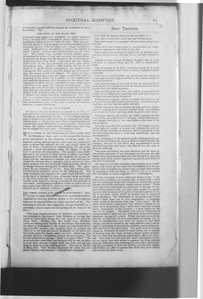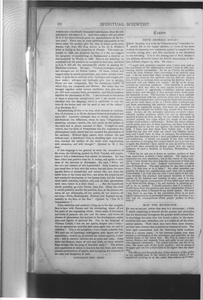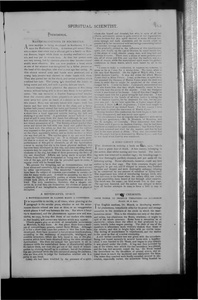< Cosmism. Anthromorphism. Spirituality and Idolatry (continued from page 3-27) >
...
Do Coming Events Cast Their Shadows Before?
Do Coming Events Cast Their Shadows Before? Shelley had so many idiosyncracies in his remarkably sensitive organization, that any positive answer to the above question must not be expected from any single experience of his. The following is none the less suggestive, though dismissed as a coincidence, since it came into and prefigured the close of his life:—
“The most singular instance (of Shelley’s peculiarities) is that recorded in the diary of Capt. Williams as having happened at Lerici itself, during the very days of his last residence there. ‘Monday, May 6th,’ writes Capt. Williams, ‘after tea walking with Shelley oh the terrace, and observing the effect of moonshine on the waters, he complained of being unusually nervous; and, stopping short, he grasped me violently by the arm, and stared steadfastly on the white surf that broke upon the beach under our feet. Observing him sensibly affected, I demanded of him if he were in pain. But he only answered by saying, “There it is again—there!” He recovered after some time, and declared that he saw, as plainly as he then saw me, a naked child rise from the sea, and clasp its hand as in joy, smiling at him.’ This was on the 6th of May, 1822. Two months afterwards the omen was fulfilled,—Shelley was drowned.”—Macmillan’s Magazine.
Have Animals Souls?
Prof. Agassiz, in a work on “Classification,” concedes immortal life to the higher animals, by virtue of the same method of reasoning now commonly applied in support of Immortality among men; and this conclusion is not disturbed by the following. It is in the closing part of Prof. Huxley’s late address, delivered before the British Association, at Belfast, Ireland, August 25, 1874. He says,—
“I might with propriety consider what I have now said as the conclusion of the observations which I have to offer concerning animal automatism. So far as I know, the problem which we have hitherto been discussing is an entirely open one. I do not know that there is any reason on the part of any person, whatever his opinions may be, that can prevent him, if he be so inclined, from accepting the doctrine which I have just now put before you clearly. So far as we know, animals are conscious automata. That doctrine is perfectly consistent with any view we may choose to take on a very curious subject of peculation, — whether animals possess souls or not; and whether, if they possess souls, those souls are immortal or not. The doctrine to which I have referred is not inconsistent with the perfectly strict and literal adherence to the scripture text concerning the beast that perisheth, nor, on the other hand, so far as 1 know, does it prevent anyone from entertaining the amiable convictions ascribed by Pope to his untutored savage, that when he passed to the realms of the blessed his faithful dog should bear him company. In fact, all the accessory questions to which I have referred, involve problems which cannot be discussed by physical science as such, as they lie not within the scope of physical science, but come within the scope of that great mother of all science,—philosophy. Before any direct answer can be given upon any of these questions, we must hear what philosophy has to say for and against the views that may be held. I have now laid these wets before you. I do not doubt that the fate will befal me which has befallen better men, and I shall have to bear in patience the reiterated assertion that doctrines such as I have put before you have very evil tendencies. I should not wonder if you were told that my intention in bringing this subject before you is to lead you to apply the doctrine I have stated to man as well as brutes, and it will then certainly be further stated that the logical tendency of such a doctrine is Fatalism, Materialism, and Atheism.
“Now let me ask you to listen to another product of that long experience to which I have referred. The logical consequences are very important; but in the course of my experience I have found that they were the scarecrows of fools and the beacons of wise men. Logical consequences can take care of themselves. The only question for any man to ask it this: ‘Is this true or is it false?’ No other question can possibly be taken into consideration until that one is settled. Undoubtedly I do hold that the view I have taken of the relations between the physical and mental faculties of brutes, applies in its fullness and entirety to man; and if it was true that the logical consequences of that belief must land me in all these terrible things, I do not hesitate in allowing myself to be so landed. I should conceive that if I refused, I should have done the greatest and most abominable violence to everything which is deepest m my moral nature. But now I beg leave to say that, in my conviction, there is no such logical connection as is pretended between the doctrine I accept and the consequences which people profess to draw from it.”
A Bird Ghost Story
The Atheneum, noticing a book on birds, says, -Birds have a great fear of death. A hen canary, belonging to the author, died whilst nesting and was buried. The surviving mate was removed to another cage; the breeding-cage itself was thoroughly purified, cleansed, and put aside till the following spring. Never afterwards, however, could any bird e min re to be in that cage. The little creatures fought and struggled to get out, and if obliged to remain, they huddled together and moped and were thoroughly unhappy, refusing to be comforted by any amount of sunshine or dainty food. The experiment was tried of introducing foreign birds, who were not even in the house when the canary died, nor could, by any possibility, have heard of her through other canaries. The result was the same; no bird would live in that cage. The cage was haunted and the author was obliged to desist from all further attempts to coax or force a bird to stay in it.”
Editor's notes
- ↑ Do Coming Events Cast Their Shadows Before? by unknown author, Spiritual Scientist, v. 1, No. 4, October 1, 1874, p. 41. From Macmillan's Magazine
- ↑ Have Animals Souls? by unknown author, Spiritual Scientist, v. 1, No. 4, October 1, 1874, p. 38
- ↑ A Bird Ghost Story by unknown author, Spiritual Scientist, v. 1, No. 13, December 3, 1874, p. 153
Sources
-
Spiritual Scientist, v. 1, No. 4, October 1, 1874, p. 41
-
Spiritual Scientist, v. 1, No. 4, October 1, 1874, p. 38
-
Spiritual Scientist, v. 1, No. 13, December 3, 1874, p. 153




